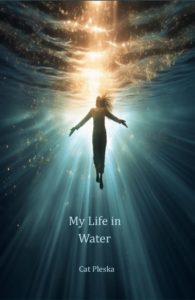 Review by Anna Rollins
Review by Anna Rollins
Refraction: a review of Cat Pleska’s My Life in Water
Cat Pleska’s gorgeous memoir, My Life in Water (Uncollected Press, 2024), begins with a near drowning: her own, at 6 months of age. Her teenage babysitter Norma is not neglectful. Her mistake is a momentary lapse: she steps away from the tub, just briefly, to grab a towel to wrap and warm the freshly bathed baby.
In the essay entitled, “Wash Me Clean,” the author observes her own past trauma as third-person spectator: “there, completely underwater, lay the baby, staring wide-eyed up at the ceiling. No bubbles, no movement” (2). This objective account is startling in the most propulsive way. It is not until the end of the essay that the reader learns that the baby described is the narrator herself.
Pleska, too, does not realize that she was subject to this near-fatal tragedy until decades later. She visits her former babysitter Norma, a woman who has shown great care for her throughout her life, at Christmas. During their time together, Norma confesses the secret she had kept from everyone, including Pleska’s mother: the author’s near-drowning. “Before I’d had a chance to say my first words, before my first step, water nearly claimed me,” (4) Pleska writes. In so many accounts throughout the memoir, Pleska experiences danger alongside water.
Cat Pleska, a seventh-generation West Virginia native, is president and chief editor at Mountain State Press and an English faculty member at Marshall University. Her first memoir, Riding on Comets (West Virginia University Press, 2015), tells her story of growing up working class as an only child in Appalachia during the 1950s. Though her parents were unable to finish high school and could not follow their dreams due to poverty, they always tried to lift her up to something extraordinary, to follow her dreams like a comet in the night sky.
In My Life in Water, the author revisits her childhood, this time using water as a framework through which to examine her experiences. Water is simultaneously what we cannot live within nor without. With this extended metaphor, Pleska invites readers to consider how paradox pervades a life.
Water is not just thematic throughout the text; it is a tool used to complicate that which appears clear. The result is a sort of narrative refraction. When we examine an object in water, our view distorts with the slightest ripple or shift of light. This refraction is precisely what Pleska accomplishes as she uses water as a lens to re-see her life.
Pleska’s accounts in water are not only near-tragedies – she finds comfort there, too. She describes hiding away in a cellar house where she loves to read during rowdy thunderstorms. On the cusp of puberty, she uses a drainage pond as a mirror to examine her own reflection.
In one particularly poignant essay about parenthood, Pleska examines her relationship with her father and concludes that blood is not necessarily thicker than water. Throughout the memoir, Pleska’s fraught relationship with her father – a man who longed for a son and not a daughter – teaches her that it’s “fluid, this who-you-love business” (44).
Though her father’s emotional absence ripples continuously throughout the collection, she experiences paternal love in the water – specifically, in the Atlantic Ocean. As she stares at the endless body of water with trepidation, her uncle offers to accompany her in the surf. She’s never held her own father’s hand — never even kissed his cheek.
In the ocean, she wades in with hesitance. But her uncle offers his assistance. He promises to show her how to keep her head above water. She takes his hand, noting its strangeness. And he continues to hold her as the waves crash around them.
Pleska captures experiences of refraction and renewal throughout this collection. She looks at the ways our needs ripple out to the rest of our relationships. Her narratives, though often harrowing, interrogate what is common to the human experience: our fears of death and our desires to be held and loved.
My Life in Water by Cat Pleska
Uncollected Press, 2024, $18.95
ISBN 9798990558533
Anna Rollins’s work has appeared in the New York Times, Slate, Salon, Electric Literature, Joyland Magazine, and other outlets. Her forthcoming memoir, Famished, (Eerdmans, 2025) challenges scripts that encourage women to take up less space and not trust their own bodies, messages that are common in diet and purity culture. She is a faculty member in the English department at Marshall University.
